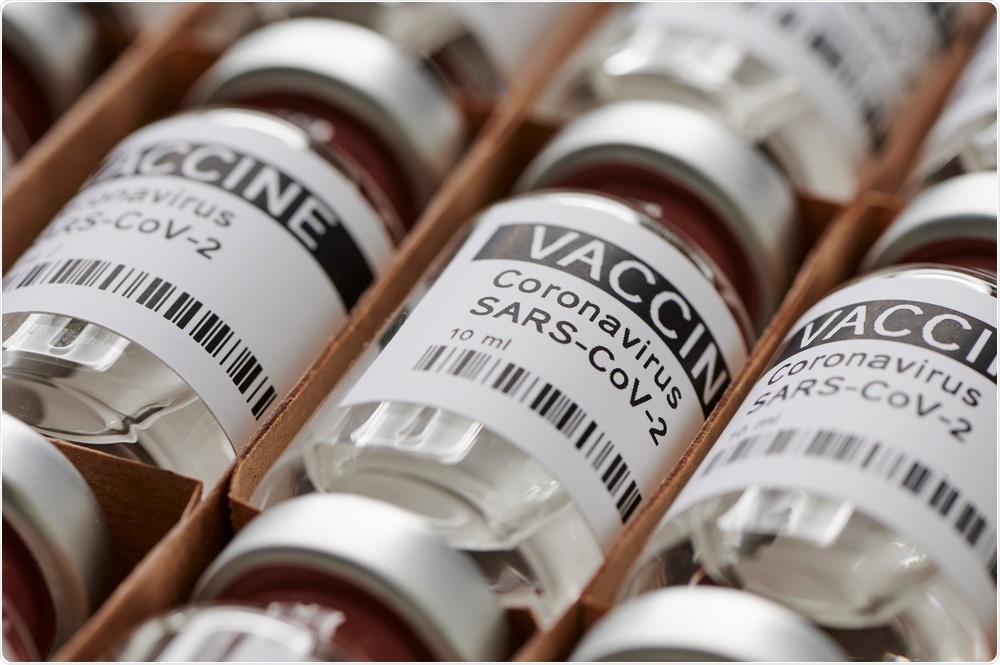Researchers from the University of Oxford and the Cantonal Hospital St. Gallen, Switzerland, suggest that adenovirus vaccine vectors, like ChAdOx1 nCov-19 construct which has become more prominent as a significant vaccine for COVID-19, may create strong long-term immune system responses.

COVID-19 Vaccine. Image Credit: M-Foto/Shutterstock.com
The findings published in the Nature Immunology journal elaborates the prominent features of adenovirus vaccines and their capability to create robust and sustained populations of the “killer” T-cell element of the immune system.
The researchers used an animal model and observed that adenoviruses are capable of entering into long-lived tissue cells, called fibroblastic reticular cells. They, in turn, form small, well-organized clusters, which act as “training grounds” for the T-cells, appearing to elucidate how these vaccines sustain robust immune system responses.
Millions of people will have received adenovirus vaccines around the world, not only the Oxford-AstraZeneca vaccine, but the J&J vaccine, and also the Chinese and Russian versions. The ultimate goal with these vaccines is the induction of long-term immune system protection using both antibodies and T-cells. This research helps us to understand more on the process of vaccination, and why the effects on killer T-cells are so prolonged.”
Paul Klenerman, Study Lead Author, Sidney Truelove Professor, Gastroenterology, Nuffield Department of Medicine, University of Oxford
The scientists demonstrated that adenovirus vectors can target specific cells—called stromal cells in tissues like lungs—creating antigen “depots” in these long-lived cells. These stromal cells were initially considered to provide an inert scaffold for the tissues; however, it seems they are highly dynamic cells with a prominent role in immune control.
The long-lived nature of the cells implies that the antigen can be “shown” to the immune system numerous times, thus effectively boosting the response, a vital element for generating protective T-cells.
The researchers also investigated other mechanisms that may explain the specific efficacy of adenovirus vectors, along with the key chemical messenger involved in signaling to T cells. This is a factor known as IL-33—what is called “alarmin” released when the stromal cells get signals of distress. IL-33 serves to powerfully boost the metabolism of the T cells, leading to more energetic cells and an extremely protective immune response.
Adenoviruses have co-evolved with humans over a very long time and learned a lot about the human immune system in the process. Viruses are always the best teachers, and here they have taught us an important lesson about how best to boost killer T cell responses.”
Burkhard Ludewig, Study Lead Author and Professor, University of Zurich
“The T cells that come from these cellular training camps appear to have a very high level of “fitness”. Hopefully, we can put this to good use in designing new vaccines; vaccines that we still desperately need for diseases such as TB, HIV, hepatitis C, and cancers,” added Burkhard Ludewig, who is also the Head of the Medical Research Center, Cantonal Hospital St. Gallen, Switzerland.
The scientists intend to continue the analysis of these specific pathways for immunization against emerging pathogens, both in pre-clinical models and clinical studies, to help speed up further development of critical vaccines.
Source:
Journal reference:
Cupovic, J., et al. (2021) Adenovirus vector vaccination reprograms pulmonary fibroblastic niches to support protective inflating memory CD8+ T cells. Nature Immunology. doi.org/10.1038/s41590-021-00969-3.